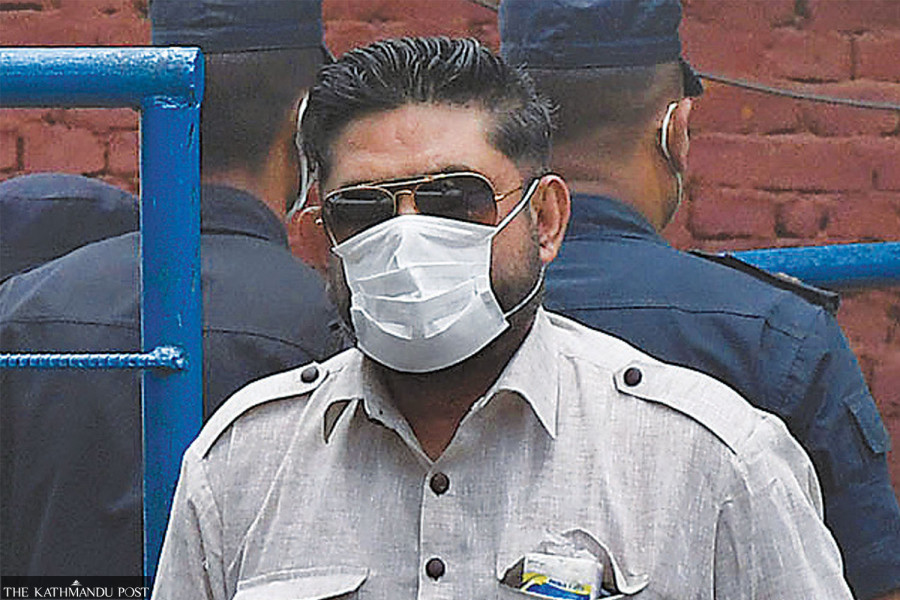National
Top court full bench quashes decision to reduce life sentence of Ranjan Koirala
Koirala’s sentence was reduced to 8 years, 6 months. He was released on July 23, 2020.
Tika R Pradhan & Binod Ghimire
The Supreme Court on Thursday quashed its own previous decision to reduce the life sentence of Ranjan Koirala, a former deputy inspector general of the Armed Police Force, for murdering his wife.
With the review, Koirala, who was freed two years ago, will now have to serve the remaining eleven and a half years of the full term, which is 20 years.
A full bench of Acting Chief Justice Deepak Kumar Karki and justices Tanka Bahadur Moktan and Kumar Chudal quashed the earlier verdict of June 2020 that had reduced the life term handed down to Koirala to eight years and six months.
“The Supreme Court has quashed the previous decision to set eight years and six months of imprisonment for Ranjan Koirala,” said Bimal Poudel, spokesperson for the Supreme Court. “The full bench has also upheld the decision of the then Patan Appellate Court.”
The court, however, is yet to issue the full text of the decision.
The Supreme Court had on July 26, 2020 decided to review a judgment passed by the division bench of Chief Justice Cholendra Shumsher Rana and Justice Tej Bahadur KC to reduce punishment for Koirala, who had been given a life term on the charge of murdering his wife, Gita Dhakal.
Koirala was released on July 23, 2020 after the division bench of Rana and KC said on June 29 that he could be released after serving eight years and six months in jail arguing that the life imprisonment was too harsh, as the incident seemed accidental.
The verdict by the Rana-led bench caused controversy, prompting the Supreme Court to go for a review.
On July 26 that year, the top court decided to review the judgment passed by Rana and KC to cut short the punishment for Ranjan Koirala.
On behalf of the Office of the Attorney General, Hareram Dhakal, father of Gita Dhakal, the first informer of the case, filed the petition at the Supreme Court on July 23, saying that employing Muluki Ain’s Section 188, which allows a judge to exercise discretion in mitigating punishment, was not appropriate, and the assumption that the crime was accidental and was provoked by his wife and was committed without mens rea—the intention or knowledge of wrongdoing that constitutes part of a crime—was wrong.
The three-member bench of justices Bam Kumar Shrestha, Prakash Kumar Dhungana and Kumar Regmi, constituted after the review petition was filed, had agreed to review the verdict.
“Koirala was found to have denied having committed the crime and there is no condition to assume that the incident was accidental... or it happened under normal circumstances as he had attempted to hide the body,” the decision of the three-justice bench had noted.
“The decision to use Section 188 of Muluki Ain seems to go against the principle set by a number of Supreme Court decisions… so this court allows a review of its decision of June 29 as per Section 11 (2) of the Judicial Administration Act 2073.”
Reacting to the review, legal experts on Thursday said the victim has received justice.
“The full bench has corrected the flawed verdict. Justice has been delivered to the victims from Thursday's decision,” said Balaram KC, former justice of the Supreme Court. “Due to the unnecessary generosity of Chief Justice Rana-led division bench the victims had to suffer a lot.”
He said it is not common for the Supreme Court to quash its own decision in Nepal. According to KC quashing a previous decision means there had been an apparent error in the earlier judgment.
Koirala was handed down a life term by the Kathmandu District Court in January 2012, and the decision was upheld by the then Patan Appellate Court. Koirala killed his wife Gita in February 2012. Her half-burnt body was found at Matrang of Tistung in Makwanpur district.
Rana currently remains suspended since an impeachment motion was filed against him on February 13. He had long been facing criticism for promoting corruption in the judiciary and many of his verdicts in the Supreme Court and other lower courts have been controversial.
The House, however, is yet to proceed with the impeachment motion.




 20.12°C Kathmandu
20.12°C Kathmandu















